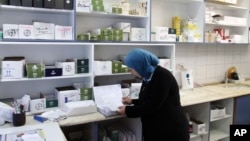LONDON —
Palestinian refugees and those living in the West Bank and Gaza are a facing an urgent health emergency, according to to the British public health journal, the Lancet.
The Lancet has published 32 reports highlighting a range of health concerns for Palestinian refugees living across the Middle East and Palestinian territories.
The journal says Palestinian refugees are dealing with a “hidden crisis” of high levels of chronic and acute illnesses.
Researchers from the American University of Beirut surveyed Palestinians living in refugee camps and other parts of Lebanon. They found that 31 percent of the more than 300 people interviewed had chronic illnesses. Just under half of those surveyed had water leaking from their walls or roofs, conditions that can be health threatening.
Another study from the same university found displaced Palestinians living in Lebanon are struggling with a low availability of adequate food. A survey of around 2,500 households showed 63 percent were experiencing some food insecurity and 13 percent reported being severely in need of proper food.
The World Health Organization Representative for the West Bank and Gaza Strip Tony Laurance, whose research was published in the Lancet, says many Palestinians face advanced illnesses, including cancers. He says they struggle to get proper treatment because most Palestinians are refused permits to cross into Israel.
“Historically their main specialized hospitals have been charitable hospitals serving the Palestinian population for a century and more, which are based in East Jerusalem. Jerusalem was annexed by Israel in the 1967 war. So to get there from the West Bank they have to cross the separation barrier,” Laurance said.
According to Laurance's research, 19 percent of patients in the West Bank who applied for Israeli permits for health-care reasons had their requests either denied or delayed. He says the Israeli authorities have made efforts to improve access. But Laurance says the efforts have not gone far enough.
“I think the Israeli authorities have made efforts to ensure as many people as possible get their permits in time, but still there are 10 percent of patients that do not. And that 10 percent, 1,000 patients a year approximately, is an issue of concern. Statistics do not sound very telling or emotional, do they? But when you think of this in terms of the individuals concerned or their families, I think you begin to appreciate what it actually means to the human beings involved,” Laurance said.
A spokesperson for Israel’s Ministry of Health declined to comment to VOA on the findings of the Lancet reports. The Lancet has been annually highlighting the plight of Palestinians.
In 2009, the journal described the health-care system in the Palestinian territories as "fragmented and incoherent". An Israeli government spokesperson described that report as one-sided propaganda.
The Lancet has published 32 reports highlighting a range of health concerns for Palestinian refugees living across the Middle East and Palestinian territories.
The journal says Palestinian refugees are dealing with a “hidden crisis” of high levels of chronic and acute illnesses.
Researchers from the American University of Beirut surveyed Palestinians living in refugee camps and other parts of Lebanon. They found that 31 percent of the more than 300 people interviewed had chronic illnesses. Just under half of those surveyed had water leaking from their walls or roofs, conditions that can be health threatening.
Another study from the same university found displaced Palestinians living in Lebanon are struggling with a low availability of adequate food. A survey of around 2,500 households showed 63 percent were experiencing some food insecurity and 13 percent reported being severely in need of proper food.
The World Health Organization Representative for the West Bank and Gaza Strip Tony Laurance, whose research was published in the Lancet, says many Palestinians face advanced illnesses, including cancers. He says they struggle to get proper treatment because most Palestinians are refused permits to cross into Israel.
“Historically their main specialized hospitals have been charitable hospitals serving the Palestinian population for a century and more, which are based in East Jerusalem. Jerusalem was annexed by Israel in the 1967 war. So to get there from the West Bank they have to cross the separation barrier,” Laurance said.
According to Laurance's research, 19 percent of patients in the West Bank who applied for Israeli permits for health-care reasons had their requests either denied or delayed. He says the Israeli authorities have made efforts to improve access. But Laurance says the efforts have not gone far enough.
“I think the Israeli authorities have made efforts to ensure as many people as possible get their permits in time, but still there are 10 percent of patients that do not. And that 10 percent, 1,000 patients a year approximately, is an issue of concern. Statistics do not sound very telling or emotional, do they? But when you think of this in terms of the individuals concerned or their families, I think you begin to appreciate what it actually means to the human beings involved,” Laurance said.
A spokesperson for Israel’s Ministry of Health declined to comment to VOA on the findings of the Lancet reports. The Lancet has been annually highlighting the plight of Palestinians.
In 2009, the journal described the health-care system in the Palestinian territories as "fragmented and incoherent". An Israeli government spokesperson described that report as one-sided propaganda.




